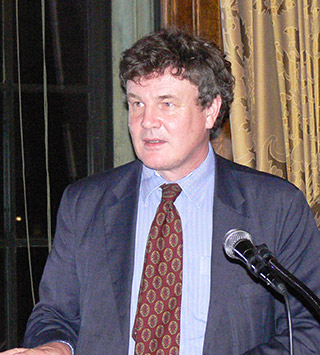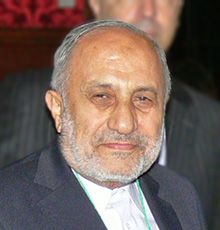
A Talk by Peter Oborne, Daily Telegraph Columnist
BICC Annual Dinner, Members' Dining Room of the House of Commons
A Talk by Peter Oborne, Daily Telegraph Columnist, October 18, 2013

On 18th October, the Chamber held its Annual Dinner in the Members' Dining Room of the House of Commons.
Lord Lamont welcomed 130 members and their guests, in particular the delegation of 17 senior business people from Iran led by HE Mr Khamoushi, the President of the Irano-British Chamber of Commerce, Industries and Mines, our counterpart chamber in Iran.
Having commented on the current situation, Lord Lamont then introduced, Peter Oborne, a very well-known journalist, commentator and author. He is a Daily Telegraph columnist and formerly a contributing editor for The Spectator.
Mr Oborne's remarks ranged widely.
He said that he was honoured to be invited to speak to the Chamber in the magnificent setting of the Members' Dining Room adjacent to the debating chamber of the House of Commons. He spoke in a personal capacity and the views expressed were not those of the Daily Telegraph.
Mr Oborne said that the relationship between Iran and the UK had been long-standing. Bi-lateral relations between the governments had had their ups and downs, but over the long-term, the relationship between the two societies had been close. However Iran had suffered from the lies and misrepresentation of many parts of the British media, reporting hadn't been balanced and he hoped this would change over time.
A most extraordinary thing had happened recently a few yards away in the Commons chamber next door. MPs had voted against the government policy of airstrikes on Syria. After this government defeat, many had said that this was a weakening of government policy and a sign of national decline. Mr Oborne said that, on the contrary, it was a pivotal moment whose consequences were felt around the world.
Mr Oborne argued that the vote and the government's decision to abide by it, led to a change in western policy not just towards Syria but across the Middle East more widely. Russian Foreign Minister Lavrov had been able to persuade Syria to agree to give up its chemical weapons. The US Administration followed the UK, deciding to forgo military action. This very quickly made possible realistic, serious negotiations with Iran about the nuclear programme.

Mr Oborne then went on to argue that the system of alliances in the region was changing. Two years ago the Middle East was divided into two hostile camps. On one side, to which the US and the UK were allied, were Saudi Arabia, the Gulf States and Israel. Also, it must be noted, it has included al Qaeda affiliates. On the other side Iran, the Syrian government and Hezbollah were closely allied.
He said it was difficult to understand why the UK was so strongly allied to the former camp. He speculated that part of the reason was Iran was poorly reported and portrayed as an exporter of global terror. He said that there were indeed powerful reasons to criticise Iran for failings in human rights and other areas. But, he pointed out, Iran had offered to help in the pursuit of the perpetrators of the Twin-Towers attack; its enemies were the Taliban and Al Qaeda. Iran had made a number of overtures to the West and until recently these have been contemptuously rejected. On the nuclear issue, in Mr Oborne's opinion, Iran has done little more than exercise its rights under the NPT.
Mr Oborne argued that many in the west had yet to understand that the United States and its allies had often behaved irrationally and unfairly rather than the other way round. He argued that the deal agreed yesterday iis, in its fundamentals, identical to the one offered by the Iranians during the last set of negotiations in 2005. At that time, the US wouldn't tolerate the operation of even one centrifuge in Iran. Now, when around 19,000 centrifuges have been installed, the US has bowed to the inevitable. In other words all the pain and agony of the last eight years could have been avoided.
Mr Oborne concluded by saying that the world today is a far more hopeful place than it has been for many years. Much of this was down to the good sense of the new Iranian leadership under President Rouhani, but also he lavished praise on Secretary of State Kerry. He said that he hoped that the nuclear agreement with Iran would only be the beginning of a new world where Iran and the West could once again live together in harmony.
The content of this talk does not necessarily express the views of The British Iranian Chamber of Commerce. The views and opinions expressed are those of the author.